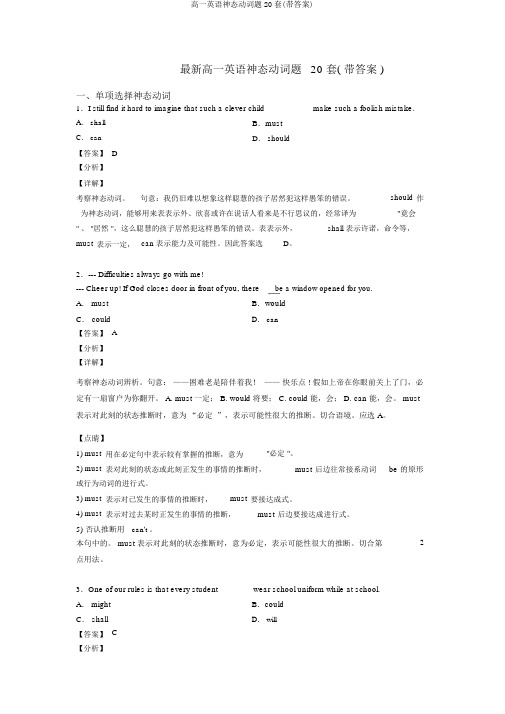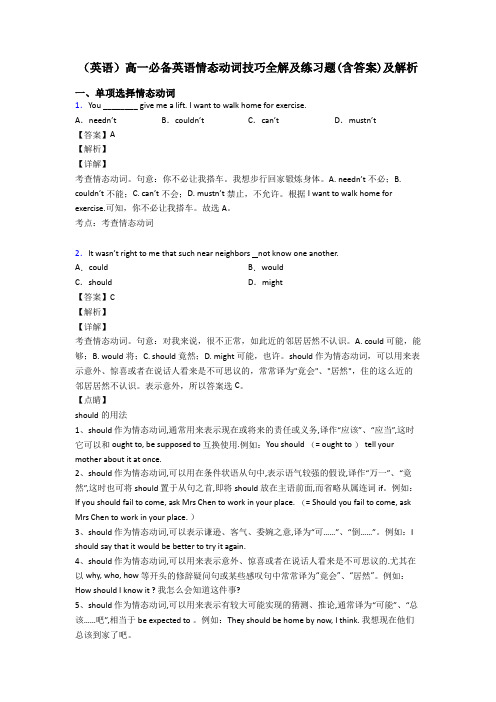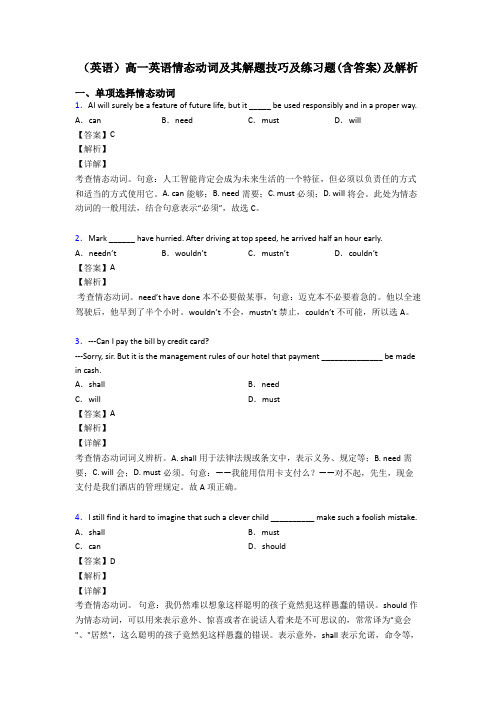英语同步练习题考试题试卷教案高一英语情态动词专题
【英语】高一英语情态动词的技巧及练习题及练习题(含答案)及解析

【英语】高一英语情态动词的技巧及练习题及练习题(含答案)及解析一、单项选择情态动词1.It has been announced that all the students ________ put on masks before going to school in case they are infected with SARS virus.A.shall B.will C.need D.may【答案】A【解析】【详解】【详解】考查情态动词。
句意:所有学生们应在去学校之前带上口罩以防感染非典病毒,这已经被宣布。
shall用于第二、第三人称,表示说话人给对方命令、警告、允诺或威胁,故选A 项。
2.We’ll make the final decision on our scheme. ______ you change your mind, please inform us as soon as possible.A.Should B.Were C.Would D.Had【答案】A【解析】【分析】【详解】考查虚拟语气。
句意:我们将对我们的计划做最后决定。
如果你改变主意,请尽快通知我们。
根据语境,此处用虚拟语气,表示与将来相反,从句用should+动词原形,省略if,should提前,陈述句是:If you should change your mind……。
故选A。
【点睛】虚拟语气中的倒装当虚拟条件句中含有 were,had,should时,可以将if省略,然后将 were,had,should,移至句首:1)If he should fail, he would kill himself.→Should he fail, he would kill himself.万一失败,他就会自杀。
2)If I were you, I would do it at once.→Were I you, I would do it at once.假若我是你,我就会马上做。
高一英语情态动词题20套(带答案)

最新高一英语神态动词题20 套( 带答案 )一、单项选择神态动词1.I still find it hard to imagine that such a clever child __________ make such a foolish mistake. A. shall B.mustC. can D. should【答案】D【分析】【详解】考察神态动词。
句意:我仍旧难以想象这样聪慧的孩子居然犯这样愚笨的错误。
should作为神态动词,能够用来表表示外、欣喜或许在说话人看来是不行思议的,经常译为"竟会" 、 "居然 ",这么聪慧的孩子居然犯这样愚笨的错误。
表表示外,shall 表示许诺,命令等,must表示一定,can 表示能力及可能性。
因此答案选D。
2.--- Difficulties always go with me!--- Cheer up! If God closes door in front of you, there be a window opened for you.A. must B.wouldC. could D. can【答案】A【分析】【详解】考察神态动词辨析。
句意:——困难老是陪伴着我!——快乐点 ! 假如上帝在你眼前关上了门,必定有一扇窗户为你翻开。
A. must 一定; B. would 将要; C. could 能,会; D. can 能,会。
must 表示对此刻的状态推断时,意为“必定”,表示可能性很大的推断。
切合语境。
应选 A。
【点睛】1) must用在必定句中表示较有掌握的推断,意为"必定 "。
2) must表对此刻的状态或此刻正发生的事情的推断时,must后边往常接系动词be 的原形或行为动词的进行式。
3) must表示对已发生的事情的推断时,must要接达成式。
4) must表示对过去某时正发生的事情的推断,must后边要接达成进行式。
(英语)高一必备英语情态动词技巧全解及练习题(含答案)及解析

(英语)高一必备英语情态动词技巧全解及练习题(含答案)及解析一、单项选择情态动词1.You ________ give me a lift. I want to walk home for exercise.A.needn’t B.couldn’t C.can’t D.mustn’t【答案】A【解析】【详解】考查情态动词。
句意:你不必让我搭车。
我想步行回家锻炼身体。
A. needn’t不必;B. couldn’t不能;C. can’t不会;D. mustn’t禁止,不允许。
根据I want to walk home for exercise.可知,你不必让我搭车。
故选A。
考点:考查情态动词2.It wasn’t right to me that such near neighbors not know one another.A.could B.wouldC.should D.might【答案】C【解析】【详解】考查情态动词。
句意:对我来说,很不正常,如此近的邻居居然不认识。
A. could可能,能够;B. would将;C. should竟然;D. might可能,也许。
should 作为情态动词,可以用来表示意外、惊喜或者在说话人看来是不可思议的,常常译为"竟会"、"居然",住的这么近的邻居居然不认识。
表示意外,所以答案选C。
【点睛】should的用法1、should 作为情态动词,通常用来表示现在或将来的责任或义务,译作“应该”、“应当”,这时它可以和 ought to, be supposed to 互换使用.例如:You should (= ought to ) tell your mother about it at once.2、should 作为情态动词,可以用在条件状语从句中,表示语气较强的假设,译作“万一”、“竟然”,这时也可将 should 置于从句之首,即将 should 放在主语前面,而省略从属连词 if。
(英语)高一英语情态动词解题技巧及练习题(含答案)

(含答案)一、单项选择情态动词1.—It ’ s so hot and uncomfortable here! Why are your windows still closed? —Oh, I ’ m not to blame. They ___ open.A. shan ’t B. mustn ’t C. won ’t D . wouldn ’t【答案】C【解析】【详解】考查情态动词辨析。
句意:---这里又热又不舒服!你的窗户怎么还关着?---哦,不该责备我啊。
窗户打不开了。
shan' t= shall no意为不可,不应";mustn' t=must not意为不要”;wouldn't=would not意为不会,不愿意"。
won' t=will not意为不会,不能“,will在这里表示能力、功能。
例如:This auditorium will seat one thousand people. 这个礼堂能容纳一千人。
这句话意思是“这扇窗不能打开” ,故选 C 项。
2.—What ’ s wrong with you?—Oh, I am sick. I __ so much ice cream just now.A.shouldn ’ t eat B.mustn ’ t eatC.couldn ’ t have eaten D.shouldn ’ t have eaten【答案】D【解析】【详解】考查情态动词和虚拟语气。
句意:——你怎么了?——我生病了,我刚才不应该吃那么多冰激凌。
A. shouldn ' t eat应该吃;B. mustn' t e豢止吃;C. couldn ' t have eaten可能吃;D. shouldn ’ t heaveaten 本来不应该吃。
根据just now 可知,是发生在过去,故选D。
高中英语情态动词专题练习(含答案)

高中英语情态动词专题练习(含答案)1.---- Look。
it ________ be Lao Wang.No。
it ________ be him。
He has gone abroad.A.may。
mustn’tB。
must。
may notC。
must。
can’tD。
can。
may not2.---- I’ve XXX.It ________ Harry’s。
He always wears green.A.would beB。
will beC。
could beD。
have to be3.Where ________ that noise be coming from?A.XXX.If it is the best thing to do。
it cannot be done ________ soon.A.XXX.I ________ XXX.A.XXXC.XXX6.I really appreciate ________ XXX.A。
XXX ________ walk for miles and miles among the XXX.---- Excuse me。
Is this the right way to the Summer Palace?Sorry。
I am not sure。
But it ________ be.A.XXX.I ________ go shopping this afternoon。
If I do。
I will buy some fruit.A。
XXX ________ always help us out financially when XXX.A。
XXX。
---- Who is the girl standing over there?Well。
if you ________ know。
her name is Mabel.A.XXX ________ you always leave your dirty clothes in the bedroom.A。
(英语)高一英语情态动词及其解题技巧及练习题(含答案)及解析

(英语)高一英语情态动词及其解题技巧及练习题(含答案)及解析一、单项选择情态动词1.AI will surely be a feature of future life, but it _____ be used responsibly and in a proper way. A.can B.need C.must D.will【答案】C【解析】【详解】考查情态动词。
句意:人工智能肯定会成为未来生活的一个特征,但必须以负责任的方式和适当的方式使用它。
A. can能够;B. need需要;C. must必须;D. will将会。
此处为情态动词的一般用法,结合句意表示“必须”,故选C。
2.Mark ______ have hurried. After driving at top speed, he arrived half an hour early. A.needn’t B.wouldn’t C.mustn’t D.couldn’t【答案】A【解析】考查情态动词。
need’t have done 本不必要做某事,句意:迈克本不必要着急的。
他以全速驾驶后,他早到了半个小时。
would n’t不会,mustn’t禁止,couldn’t不可能,所以选A。
3.---Can I pay the bill by credit card?---Sorry, sir. But it is the management rules of our hotel that payment ______________ be made in cash.A.shall B.needC.will D.must【答案】A【解析】【详解】考查情态动词词义辨析。
A. shall用于法律法规或条文中,表示义务、规定等;B. need需要;C. will会;D. must必须。
句意:——我能用信用卡支付么?——对不起,先生,现金支付是我们酒店的管理规定。
(英语)高一英语情态动词的技巧及练习题及练习题(含答案)及解析

(英语)高一英语情态动词的技巧及练习题及练习题(含答案)及解析一、单项选择情态动词1.Frankly speaking, I am not sure whether I ________ this in the old days with that kind of equipment, which looks quite odd and ridiculous.A.should have done B.need have done C.would have done D.must have done 【答案】C【解析】【详解】考查情态动词+have done。
句意:坦率地说,我不确定在过去我是否会用这种设备做这件事,这看起来很奇怪和可笑。
A. should have done表示本应该做某事,而实际上没有做某事;B. need have done表示本来需要做某事而没有做;C. would have done虚拟语气,表示对过去事情的假设,意思是“本来会做”;D. must have done表示对过去事情的肯定推测,译成“一定做过某事”。
由“in the old days”可知,本句表示对过去事情的假设。
故选C项。
2.According to a newly released regulation on online video services, no one _____ generate, release or spread fake news or information by using such technologies.A.can B.shall C.will D.may【答案】B【解析】【详解】考查情态动词。
句意:根据最新发行的关于网络视频服务的规章,任何人都不可以使用此类技术生成、发行或者传播虚假消息。
A. can 能够,有时会;B. shall 一三人称表示征求对方意见;二三人称陈述句,表示允诺、威胁、恐吓或法律条文的规定。
高一英语情态动词解题技巧及练习题(含答案)含解析

高一英语情态动词解题技巧及练习题(含答案)含解析一、单项选择情态动词1.he law is equally applied to everyone. No one _______ be above it.A.shall B.mustC.may D.need【答案】A【解析】【详解】考查情态动词。
句意:法律面前人人平等。
没有人能凌驾于法律之上。
A. shall用于第二、第三人称,则含有命令、警告、允诺或威胁的语气。
B. must(必须,一定)用于肯定句。
C. may(可以,能够)表允许时一般不与第三人称连用。
D. need (表示没有必要或询问是否有必要) 需要;故选A。
2.Students ____ remain in their seats until all the papers have been collected according to the regulation.A.would B.shall C.will D.could【答案】B【解析】【详解】考查情态动词。
句意:学生们必须呆在自己的座位上,直到所有的试卷都被收回。
根据句意,“学生们呆在自己的座位上”是一项规定。
shall 可表示某种规定或义务,用于第二、三人称的句子中。
而其他情态动词无此用法。
故正确答案为B。
3.—I don’t really like Janes. Why did you invite him?—Don’t worry. He come. He said he was’t certain what his plans were.A.must not B.need not C.would not D.might not【答案】D【解析】考察情态动词,题干中的he was n’t certain说明他可能不来,可能来,因此使用不完全否定,might not。
4.Frankly speaking, I am not sure whether I ________ this in the old days with that kind of equipment, which looks quite odd and ridiculous.A.should have done B.need have done C.would have done D.must have done 【答案】C【解析】【详解】考查情态动词+have done。
- 1、下载文档前请自行甄别文档内容的完整性,平台不提供额外的编辑、内容补充、找答案等附加服务。
- 2、"仅部分预览"的文档,不可在线预览部分如存在完整性等问题,可反馈申请退款(可完整预览的文档不适用该条件!)。
- 3、如文档侵犯您的权益,请联系客服反馈,我们会尽快为您处理(人工客服工作时间:9:00-18:30)。
情态动词一、情态动词表推测1. 肯定的推测一般用must, should, may(might)或could(不用can),其中,must 的语气最强,译为“肯定”、“准是”、“想必是”;should的语气次之,译为“很可能”、“应该”,指按常理推测;may(might),could的语气最弱,译为“也许”、“可能”。
①Helen _______ go on the trip with us but she isn’t quite sure yet. (2005年安徽卷)A. shallB. mustC. mayD. can②—I’ve taken someone else’s green sweater by mistake.—It ___ Harry’s. He always wears green. (2005年广东卷)A. has to beB. will beC. mustn’t beD. could be③I have lost one of my gloves. I _______ it somewhere.(2005年北京春季卷)A. must dropB. must have droppedC. must be droppingD. must have been dropped④If I ____ plan to do anything I wanted to ,I’d like to go to Tibet and travel through as much of it as possible. (2005年湖北卷)A. wouldB. couldC. had toD. ought to2. 否定推测分为两种情况:1)语气不很肯定时,常用may not, might not或could not,译为“可能不”、“也许不”。
You might just as well tell the manufacturer that male customers ______ not like the design of the furniture. (2004年上海春季卷)A. mustB. shallC. mayD. need2)否定语气较强时,则用can’t,译为“根本不可能”、“想必不会”,表示惊异、怀疑的感情色彩。
①—Do you know where David is? I couldn’t find him anywhere.—Well. He ______ have gone far——his coat’s still here.(2005年湖北卷)A. shouldn’tB. mustn’tC. can’tD. wouldn’t②— Isn’t that Ann’s husband over there?— No, it _______ be him I’m sure he doesn’t wear glasses. (2004年全国卷Ⅰ)A. can’tB. must notC. won’tD. may not3. 疑问句中的推测,往往用can或could。
Mr. Bush is on time for everything. How ______ it be that he was late for the opening ceremony?(2001年上海春季卷)A. canB. shouldC. mayD. must4. 对已发生事情的肯定推测常用“must, may, might等+完成式”;否定推测常用“can, could, may, might等+完成式”。
①I was on the highway when this car went past followed by a police car. They _______ at least 150 kilometers an hour.(2005年重庆卷)A. should have been doingB. must have been doingC. could have doneD. would have done②He _______ have completed his work; otherwise, he wouldn’t be enjoying himself by seaside. (2005年北京卷)A. shouldB. mustC. wouldn’tD. can’t③—Tom is never late for work. Why is be absent today?—Something ________ to him. (2005年江西卷)A. must happenB. should have happenedC. could have happenedD. must have happened④ My sister met him at the Grand Theatre yesterday afternoon, so he_____ have attended your lecture.(2000年上海卷)A. couldn’tB. needn’tC. mustn’tD. shouldn’t二、“情态动词+完成式”1. “should(ought to)+完成式”表示本应该做某事而实际上没有做。
其否定式表示某种行为不该发生但却发生了。
①—I’ll tell Mary about her new job tomorrow.— You________ her last week. (2004年福建卷)A. ought to tell B. would have toldC. must tell D. should have told②Oh, I’m not feeling well in the stomach, I _____ so much fried chicken just now. (2002年上海春季卷)A. shouldn’t eatB. mustn’t have eatenC. shouldn’t have eatenD. mustn’t eat2. “could+完成式”表示本来能够做成某事的但结果没能做成,含有遗憾的意味。
He paid for a seat, when he ______ have entered free. (2005年山东卷)A. couldB. wouldC. mustD. need3. “needn’t+不定式的完成式”表示本来不必做某事而实际上做了某事。
例如:You needn’t have watered the flowers, for it is going to rain.你本不需要浇花的,因为天就要下雨了。
— Catherine, I have cleaned the room for you.— Thanks. You ______ it. I could manage it myself. (2005年福建卷)A. needn’t doB. needn’t have doneC. mustn’t doD. shouldn’t have done三、常见的情态动词1. shall用于一、三人称疑问句表示征求对方意见;用于二、三人称陈述句表示说话人给对方的命令、警告、允诺或威胁等。
①“The interest be divided into five parts, according to the agreement made by both sides,” declared the judge. (2004年重庆卷)A. mayB. shouldC. mustD. shall②—Excuse me, but I want to use your computer to type a report.— You ______ have my computer if you don’t take care of it. (2004年湖南卷)A. shan’tB. might notC. needn’tD. shouldn’t③— The room is so dirty. ______ we clean it?— Of course. (2003年北京春季卷)A. WillB. ShallC. WouldD. Do2. must用于疑问句,表示责备、抱怨的感情色彩,意思为“偏偏,偏要”;mustn’t表示禁止,是说话人强有力的劝告。
①John, look at the time. _______ you play the piano at such a late hour?(2005年全国卷Ⅲ)A. MustB. CanC. MayD. Need②Tom, you leave all your clothes on the floor like this!(2005年全国Ⅰ)A. wouldn’tB. mustn’tC. needn’tD. may not3. needn’t表示“没有必要”。
— Lucy doesn’t mind lending you her dictionary.— She ______. I’ve already borrowed one. (2005年湖南卷)A. can’tB. mustn’tC. needn’tD. shouldn’t4. would表示过去反复发生的动作或某种倾向。
When he was there, he ___ go to that coffee shop at the corner after work every day.(1996年上海卷)A. wouldB. shouldC. had betterD. might5. 表示经过努力而成功的某一次动作,只能用was/were able to,而不能用could。
The fire spread through the hotel very quickly but everyone _____ get out. (1997年全国卷)A. had toB. wouldC. was able toD. could6. 考查情态动词用作答语的情况①—Write to me when you get home.— _______. (2001年北京春季卷)A. I mustB. I shouldC. I willD. I can②— Could I call you by your first name?—Yes, you ______. (1998年上海卷)A. willB. couldC. mayD. might巩固练习:1. Michael ______ be a policeman, for he is much too short.A. needn’tB. can’tC. shouldD. may2. I told Sally how to get here, but perhaps I ____ for her.A. had to write it outB. must have written it outC. should have written it outD. ought to write it out3. Jack _____ yet, otherwise he would have telephoned me.A. mustn’t have arrivedB. shouldn’t have arrivedC. can’t have arrivedD. needn’t have arrived4. Sir, you ______be sitting in this waiting room. It is for women andchildren only.A. mustn’tB. can’tC. won’tD. needn’t5. A left-luggage office is a place where bags _______ be left for a short time, especially at a railway station.A. shouldB. canC. mustD. will6. — Is John coming by train?— He should, but he _____ not. He likes driving his car.A. mustB. canC. needD. may7. It has been announced that candidates _______ remain in their seats until all the papers have been collected.A. canB. willC. mayD. shall8. You can’t imagine that a well-behaved gentleman ______ be so rude to a lady.A. mightB. needC. shouldD. would9. —Don’t forget to come to my birthday party tomorrow. —_______.A. I don’tB. I won’tC. I can’tD. I haven’t10. I didn’t see her in the meeting-room this morning. She____ at the meeting.A. mustn’t have spokenB. shouldn’t have spokenC. needn’t have spokenD. couldn’t have spoken例题答案Key: C D B B Key: C Key: C A Key:A Key: B B D A Key: D CKey:A Key: B Key: D A B Key: A B Key: C Key: AKey:C Key:C C练习答案与解析1. B 从第二个分句“他太矮了”可以推知说话者持否定态度,needn’t意思是“没有必要”,与语境不符。
